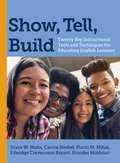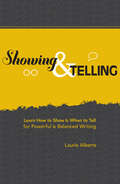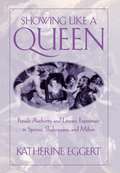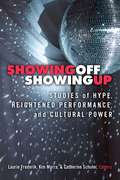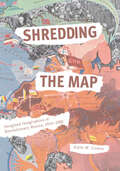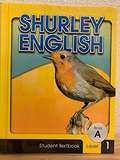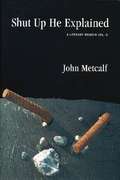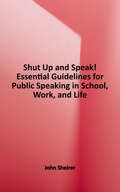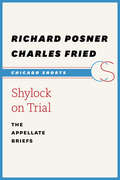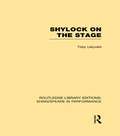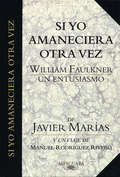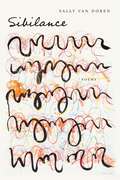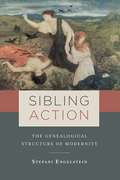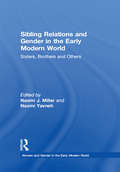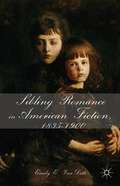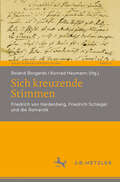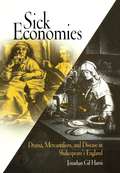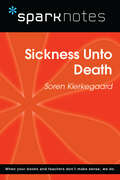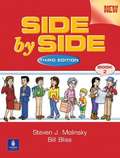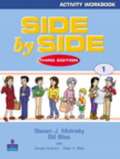- Table View
- List View
Show, Tell, Build: Twenty Key Instructional Tools and Techniques for Educating English Learners
by Joyce W. Nutta Kouider Mokhtari Carine Strebel Florin M. Mihai Edwidge Crevecoeur BryantBuilding upon the theoretical and practical foundation outlined in their previous book, Educating English Learners, the authors show classroom teachers how to develop a repertoire of instructional techniques that address K–12 English learners (ELs) at different English proficiency and grade levels, and across subject areas. Show, Tell, Build is organized around two decision maps for planning and implementing differentiated instruction for ELs: the Academic Subjects Protocol (for teachers of academic subjects) and the Language Arts Protocol (for teachers of language arts). The instructional tools and techniques described in each chapter help teachers provide communication support for ELs through showing and telling, and develop their language proficiency through building their skills. The book also discusses the demands that academic language poses for ELs and ways to assess students&’ proficiency in English. Show, Tell, Build provides classroom teachers, English language development specialists, literacy coaches, and school leaders with valuable knowledge and skills to support ELs&’ academic success.
Showing & Telling: Learn How to Show & When to Tell for Powerful & Balanced Writing
by Laurie AlbertsWrite vibrant scenes and essential summaries "Show#151;don't tell. " How many times have you heard this standard bit of writing advice? It's so common in writing courses and critiques that it has become a cliche. Writers are often told to write scenes, dramatize, cut exposition, cut summary#151;but it's misguided advice. The truth is good writing almost always requires both showing and telling. The trick is finding the right balance of scene and summary#151;the two basic components of creative prose. Showing and Tellingshows you how to employ each of these essential techniques in the appropriate places within a narrative. You'll learn how to: Write scenes and cut exposition Compress time and summarize background information Create graceful transitions Effectively inject interpretation And more! Complete with examples from bestsellers and interactive exercises, this comprehensive guide offers an in-depth look at scene development, the role of reflection in storytelling, the art of summarizing, and how to bring it all together.
Showing Like a Queen: Female Authority and Literary Experiment in Spenser, Shakespeare, and Milton
by Katherine EggertFor most Renaissance English thinkers, queenship was a catastrophe, a political accident that threatened to emasculate an entire nation. But some English poets and playwrights proved more inventive in their responses to female authority. In Showing Like a Queen, Katherine Eggert argues that Spenser, Shakespeare, and Milton turned the political problem of queenship to their advantage by using it as an occasion to experiment with new literary genres. Unlike other critics who have argued that a queen provoked only anxiety and defensiveness in her male subjects, Eggert demonstrates that even after her death Elizabeth I's forty-five-year reign enabled writers to entertain the fantasy of a counterpatriarchal realm.Eggert traces a literary history of the late sixteenth and early seventeenth centuries in which the destabilizing anomaly of female rule enables Spenser to reshape the genre of epic romance and gives Shakespeare scope to create the ruptured dynastic epic of the history plays, the psychologized tragedy of Hamlet, and the feminized tragedies of "Antony and Cleopatra" and "The Winter's Tale." Turning to the second half of the seventeenth century, Eggert reveals how even after more than sixty years of male governance, Milton bases his marital epic Paradise Lost upon the formulae of queenship.
Showing Off, Showing Up: Studies of Hype, Heightened Performance, and Cultural Power
by Catherine A. Schuler Kimberley Bell Marra Laurie FrederikThe interdisciplinary essays in Showing Off, Showing Up examine acts of showing, a particular species of performance that relies on competition and judgment, active spectatorship, embodied excess, and exposure of core values and hidden truths. Acts of showing highlight those dimensions of performance that can most manipulate spectators and consumers, often through over-the-top heightening and skewing of presentation. Many forms of showing and of heightened performance, however, operate more enigmatically and covertly while still profoundly affecting the social world, even if our reactions to them are initially flippant or unconcerned because “it’s just a show.” Examining a wide range of examples—from dog shows to competitive dancing to carnivals to striptease, the essays illuminate how such events variously foster competition, exaggerate a characteristic, and reveal hidden truths. There is as much to be learned about the power of showing through subtlety and underlying intentionality as through overt display. The book’s theoretical introduction and 12 essays by leading scholars reveal how diverse, particularly efficacious genres of showing are theoretically connected and why they merit more concerted attention, especially in the 21st century.
Shredding the Map: Imagined Geographies of Revolutionary Russia, 1914-1922
by Edith ClowesShredding the Map investigates Russian place consciousness in the decade between the start of World War I and the end of the Russian civil war. Attachment to place is a vital aspect of human identity, and connection to homeland, whether imagined or real, can be especially powerful. Drawing from a large digital database of period literature, Shredding the Map investigates the metamorphic changes in how Russians related to places–whether abstractions like “country” or concrete spaces of borders, fronts, and edgelands–during these years. An innovative, digitally-aided study of Russia’s “imagined geography” during the early decades of the twentieth century, Shredding the Map uncovers vying emotional patterns and responses to Russian ideas of place, some familiar and some quite new. The book includes new visualizations that connect otherwise invisible networks of shared place, feeling, and perception among dozens of writers in order to trace patterns of geospatial identity. A scholarly companion to the “Mapping Imagined Geographies of Revolutionary Russia” website and database, this book offers an innovative analysis of place and identity beyond the centers of power, enhancing our perceptions of Russia and encouraging debate about the possibilities for digital humanities and literary analysis.
Shrovetide in Old New Orleans
by Ishmael ReedAnother controversial and whimsical selection of short stories by acclaimed author Ishmael Reed... some of which stem back to the days of his youth and many more quite recent -- with many of them having been published previously.
Shurley English: Level 1, Book B
by Brenda ShurleyShurley English places special emphasis on parent-child interaction and participation. In Shurley English, the children have workbooks, not textbooks, to practice and test their acquired knowledge and skills. The Student Workbook contains a Jingle Section, a Reference Section, a Practice Section, and a Test Section. The Jingle Section contains all the jingles. The Reference Section includes vocabulary words, guided practices, samples, guidelines, and charts. The Practice Section provides extra practice on the various skills taught before the skills are tested. The Test Section contains the tests for each chapter. Each test is divided into four basic areas: grammar, vocabulary, language skills, and a summary for the week.
Shurley English: Student Textbook Level 8
by Shurley Instructional Materials StaffThe Student Textbook contains references, jingles, practices, checkups, and homework assignments.
Shut Up He Explained
by John MetcalfJohn Metcalf's Shut Up He Explained defies expectations and strict definition. Part memoir, part travelogue, part criticism -- wholly Metcalf -- it is thoughtful, engaged, contentious and often very funny. It offers a full does of Metcalfian wisdom and wit, and provides ample evidence that neither age nor indifference nor attack have withered him: he remains as sharp, critical, constructive and insightful as ever. Indeed, this may just be his most important and engaged book. Certainly it will be among his most controversial. What his critics will refuse to see, of course, is that it is also among his most positive, that it is a celebration of the best literature Canada has to offer, the birth of which Metcalf himself both witnesses and actively encouraged. Shut Up He Explained is magisterial, a virtuoso performance melding several seemingly different strands into one coherent narrative, which should delight and entertain as it serves to argue, elucidate and celebrate.
Shut Up and Speak!: Essential Guidelines for Public Speaking in School, Work, and Life
by John SheirerWhy does your mouth suddenly go dry, your throat tighten, your face gets hot, and your knees buckle when you have to address a group of people? The old story goes that more people are afraid of public speaking than they are of death. So people at a funeral would prefer to be the person in the casket than the person delivering the eulogy! Shut up and speak means that you must stop dwelling on how difficult or frightening public speaking is. Shut up and speak means that you can't become a better public speaker simply by studying communications theory or relying on public speaking folk wisdom. This book gives you the guidance to "shut up" by tuning out all of the interference that doesn't help you become a better public speaker and to "speak" by throwing yourself wholeheartedly into speech-making.
Shylock on Trial: The Appellate Briefs
by Charles Fried Richard PosnerWilliam Shakespeare is inextricably linked with the law, his plays rich in its terms, settings, and thought processes. In Shylock on Trial: The Appellate Briefs, the Hon. Richard A. Posner and Charles Fried rule on Shakespeare's classic drama The Merchant of Venice. Framed as a decision argued by two appellate judges of the period in a trial following Shylock's sentencing by the Duke of Venice, these essays playfully walk the line between law and culture, dissecting the alleged legal inconsistencies of Shylock's trial while engaging in an artful reading of the play itself. The resultant opinions shed fresh light on the relationship between literary and legal scholarship, demonstrating how Shakespeare's thinking about legal concepts and legal practice points to a deep and sometimes vexed engagement with the law's technical workings, its underlying premises, and its social effects.
Shylock on the Stage (Routledge Library Editions: Shakespeare in Performance)
by Toby LelyveldOriginally published in 1961, this book is a study of the ways actors since the time of Shakespeare have portrayed the character of Shylock. A pioneering work in the study of performance history as well as in the portrayal of Jews in English literature. Specifically it studies Charles Macklin, Edmund Kean, Edwin Booth, Henry Irving and more recent performers.
Si Dios no escuchase: Cartas a Malcolm acerca de la oración
by C. S. LewisCompuestas como una colección de envíos ficticios a su amigo Malcolm, Si Dios no escuchase: Cartas a Malcolm acerca de la oración considera esta muestra básica de devoción en su forma, contenido y regularidad, y las maneras en que refleja nuestra fe y moldea nuestra forma de creer.En esta edición de la ficticia colección de cartas de C. S. Lewis, el venerado autor reflexiona sobre la naturaleza de la oración: qué es, cómo funciona y cómo debe practicarse. La oración es un don puro, un gran regalo de Dios. Así lo entiende también Lewis. Con su brillantez habitual, el autor utiliza su correspondencia con otro intelectual para arrojar luz sobre cuestiones como:¿Cuál es el valor de la oración?¿Es la oración un soliloquio que nadie escucha?¿Qué ocurre realmente cuando oramos?¿Tiene sentido orar por los difuntos?¿Por qué es importante la liturgia?En sus argumentos, Lewis muestra una fuerte convicción y, al mismo tiempo, una gran sensibilidad y comprensión hacia las debilidades y temores del hombre. Aunque Lewis nunca pretendió que este fuera un libro de instrucciones sobre cómo orar, descubrió que el formato de correspondencia le permitía compartir sus reflexiones de forma dinámica y personal.Si Dios no escuchase: Cartas a Malcom acerca de la oración fue el último libro que terminó C. S. Lewis. Publicado póstumamente en enero de 1964, tres meses después de su muerte, es uno de los mejores libros de Lewis, aunque quizá no uno de los más conocidos. Letters To Malcom: Chiefly on PrayerComposed as a collection of fictitious dispatches to his friend, Malcolm, Letters to Malcolm: Chiefly on Prayer considers this basic display of devotion in its form, content, and regularity, and the ways it both reflects our faith and shapes how we believe.In this edition of C. S. Lewis&’s fictitious collection of letters, the revered author ruminates on the nature of prayer—what it is, how it works, and how it should be practiced. Prayer is a pure gift, a great gift from God. This is also how Lewis understands it. With his usual brilliance, the author uses his correspondence with another intellectual to shed light on questions such as:What is the value of prayer?Is prayer a soliloquy that no one listens to?What is happening when we pray?Does it make sense to pray for the deceased?Why is liturgy important?In his arguments, Lewis shows a strong conviction and, at the same time, a great sensitivity and understanding for the weaknesses and fears of man.While Lewis never intended this to be a book of instruction on how to pray, he found that the correspondence format enabled him to share his reflections in a dynamic and personal way.Letters to Malcolm: Chiefly on Prayer was the last book C. S. Lewis finished. Published posthumously in January 1964, three months after his death, it is one of Lewis&’s best books though perhaps not one of his best known.
Si yo amaneciera otra vez
by Javier MaríasDoce poemas de William Faulkner, pertenecientes a A Green Bough, traducidos por Javier Marías. Los comentarios del gran autor español, en parte inéditos, y el recorrido por el Mississippi de Faulkner de la mano de Manuel Rodríguez Rivero, constituyen un extraordinario homenaje a William Faulkner en el centenario de su nacimiento. El 25 de septiembre de 1997 se han cumplido cien años del nacimiento de William Faulkner, y aunque sigue siendo uno de los escritores del siglo más estudiados por los críticos y más imitados por sus colegas o descendientes, parece como si el aniversario notorio le llegara en un momento de su posteridad algo indeciso. El número de tesis, monografías y análisis universitarios no ha menguado en exceso en los últimos años, pero algunas tendencias o "escuelas" predominantes hoy en su país de origen se esfuerzan por omitirlo, orillarlo y propiciar su olvido, al ser culpable de los cuatro pecados capitales de nuestros pacatos y oportunistas tiempos, a saber: era varón, era blanco, era anglosajón machista. La literatura, los textos, han sido convertidos asombrosamente en un elemento secundario a la hora de estudiar y valorar la literatura y los textos. También es culpable sin remisión de un quinto pecado muy grave: está muerto.
Sibilance: Poems
by Sally Van DorenThe word “sibilance” refers to pronunciations of the letter “s,” including the emission of a hissing or whistling sound. As the title of Sally Van Doren’s fourth collection of poetry, the word alerts readers to the sounds of language in the poems that follow in abecedarian order. Filled with wordplay, Van Doren’s poems vacillate between the extremes of joy and despair, by turns witty and chagrined, punning and reflective.The poems gathered in Sibilance aim to clarify their author’s ambivalence concerning living life and writing about it. Her unique investigations teem with distilled images encased in the language of irreverence and awe.
Sibling Action: The Genealogical Structure of Modernity
by Stefani EngelsteinThe sibling stands out as a ubiquitous—yet unacknowledged—conceptual touchstone across the European long nineteenth century. Beginning in the late eighteenth century, Europeans embarked on a new way of classifying the world, devising genealogies that determined degrees of relatedness by tracing heritage through common ancestry. This methodology organized historical systems into family trees in a wide array of new disciplines, transforming into siblings the closest contemporaneous terms on trees of languages, religions, races, nations, species, or individuals. In literature, a sudden proliferation of siblings—often incestuously inclined—negotiated this confluence of knowledge and identity. In all genealogical systems the sibling term, not quite same and not quite other, serves as an active fault line, necessary for and yet continuously destabilizing definition and classification.In her provocative book, Stefani Engelstein argues that this pervasive relational paradigm shaped the modern subject, life sciences, human sciences, and collective identities such as race, religion, and gender. The insecurity inherent to the sibling structure renders the systems it underwrites fluid. It therefore offers dynamic potential, but also provokes counterreactions such as isolationist theories of subjectivity, the political exclusion of sisters from fraternal equality, the tyranny of intertwined economic and kinship theories, conflicts over natural kinds and evolutionary speciation, and invidious anthropological and philological classifications of Islam and Judaism. Integrating close readings across the disciplines with panoramic intellectual history and arresting literary interpretations, Sibling Action presents a compelling new understanding of systems of knowledge and provides the foundation for less confrontational formulations of belonging, identity, and agency.
Sibling Relations and Gender in the Early Modern World: Sisters, Brothers and Others (Women and Gender in the Early Modern World)
by NAOMI J. MILLER AND NAOMI YAVNEHWhile the relationships between parents and children have long been a staple of critical inquiry, bonds between siblings have received far less attention among early modern scholars. Indeed, until now, no single volume has focused specifically on relations between brothers and sisters during the early modern period, nor do many essays or monographs address the topic. The essays in Sibling Relations and Gender in the Early Modern World focus attention on this neglected area, exploring the sibling dynamics that shaped family relations from the fifteenth through the seventeenth centuries in Italy, England, France, Spain, and Germany. Using an array of feminist and cultural studies approaches, prominent scholars consider sibling ties from a range of interdisciplinary perspectives, including art history, musicology, literary studies, and social history. By articulating some of the underlying paradigms according to which sibling relations were constructed, the collection seeks to stimulate further scholarly research and critical inquiry into this fruitful area of early modern cultural studies.
Sibling Romance in American Fiction, 1835-1900
by Emily E. VandetteThis study posits that the narrative of sibling love as a culturally significant tradition in nineteenth-century American fiction. Ultimately, Emily E. VanDette suggests that these novels contribute to historical conversations about affiliation in such tumultuous contexts as sectional divisions, slavery debates, the Civil War, and Reconstruction.
Sich kreuzende Stimmen: Friedrich von Hardenberg, Friedrich Schlegel und die Romantik (Neue Romantikforschung #8)
by Roland Borgards Konrad HeumannFriedrich von Hardenberg und Friedrich Schlegel verdanken wir zwei der berühmtesten Denkfiguren der Romantik: die ‚blaue Blume‘ und die ‚progressive Universalpoesie‘. Ein wichtiger Quellpunkt solcher Denkfiguren ist der Briefwechsel zwischen Hardenberg und Schlegel, der 2022 anlässlich ihres 250. Doppelgeburtstages in einer Ausstellungreihe im Deutschen Romantik-Museum, Frankfurt am Main, zu sehen war. Begleitend zur Ausstellung hat sich eine Ringvorlesung des Instituts für Deutsche Literatur, Frankfurt, mit dem Anteil Hardenbergs und Schlegels an der frühromantischen Theoriebildung auseinandergesetzt. Der vorliegende Band dokumentiert die Beiträge dieser Ringvorlesung. Der Briefwechsel zwischen Hardenberg und Schlegel bildet dabei den Ausgangspunkt der Überlegungen. Im Zentrum stehen dabei zunächst der Brief als Medium des Symphilosophierens sowie Religion und Republik als zwei zentrale Themen des Briefwechsel. Dann aber weist der Band auch über die Fragen, die die beiden Frühromantiker im brieflichen Austausch entwickeln, hinaus. Der Akzent liegt dabei auf Themenfeldern, die in der Forschung bisher weniger intensiv aufgegriffen wurde: die Idylle, die Ökologie und die Chemie.
Sick Economies: Drama, Mercantilism, and Disease in Shakespeare's England
by Jonathan Gil HarrisFrom French Physiocrat theories of the blood-like circulation of wealth to Adam Smith's "invisible hand" of the market, the body has played a crucial role in Western perceptions of the economic. In Renaissance culture, however, the dominant bodily metaphors for national wealth and economy were derived from the relatively new language of infectious disease. Whereas traditional Galenic medicine had understood illness as a state of imbalance within the body, early modern writers increasingly reimagined disease as an invasive foreign agent. The rapid rise of global trade in the sixteenth century, and the resulting migrations of people, money, and commodities across national borders, contributed to this growing pathologization of the foreign; conversely, the new trade-inflected vocabularies of disease helped writers to represent the contours of national and global economies.Grounded in scrupulous analyses of cultural and economic history, Sick Economies: Drama, Mercantilism, and Disease in Shakespeare's England teases out the double helix of the pathological and the economic in two seemingly disparate spheres of early modern textual production: drama and mercantilist writing. Of particular interest to this study are the ways English playwrights, such as Shakespeare, Jonson, Heywood, Massinger, and Middleton, and mercantilists, such as Malynes, Milles, Misselden, and Mun, rooted their conceptions of national economy in the language of disease. Some of these diseases—syphilis, taint, canker, plague, hepatitis—have subsequently lost their economic connotations; others—most notably consumption—remain integral to the modern economic lexicon but have by and large shed their pathological senses.Breaking new ground by analyzing English mercantilism primarily as a discursive rather than an ideological or economic system, Sick Economies provides a compelling history of how, even in our own time, defenses of transnational economy have paradoxically pathologized the foreign. In the process, Jonathan Gil Harris argues that what we now regard as the discrete sphere of the economic cannot be disentangled from seemingly unrelated domains of Renaissance culture, especially medicine and the theater.
Sickness Unto Death (SparkNotes Philosophy Guide)
by SparkNotesSickness Unto Death (SparkNotes Philosophy Guide) Making the reading experience fun! SparkNotes Philosophy Guides are one-stop guides to the great works of philosophy–masterpieces that stand at the foundations of Western thought. Inside each Philosophy Guide you&’ll find insightful overviews of great philosophical works of the Western world.
Side By Side Book 2 Third Edition
by Steven J. Molinsky Bill BlissSide by Side, Third Edition, by Steven J. Molinsky and Bill Bliss, is a dynamic, all-skills program that integrates conversation practice, reading, writing, and listening -- all in a light-hearted, fun, and easy-to-use format that has been embraced by students and teachers worldwide. This four-level program promotes native communication between students.
Side by Side Activity Workbook Book 1
by Steven J. Molinsky Bill Bliss Carolyn Graham Peter S. BlissThe Side by Side Activity Workbooks offer a variety of exercises for reinforcement, fully coordinated with the student texts.

